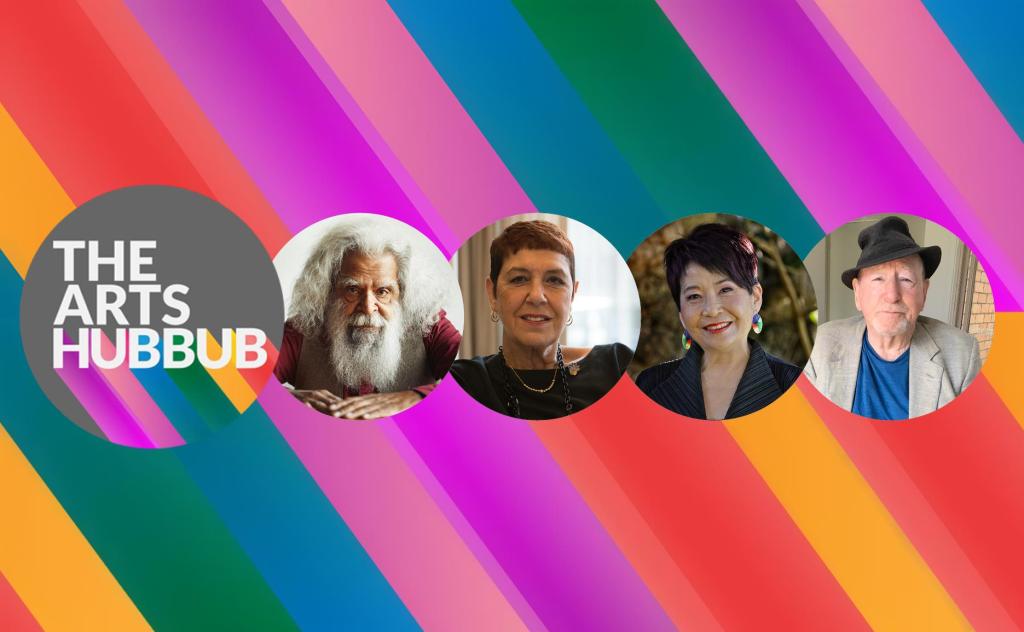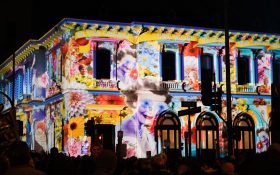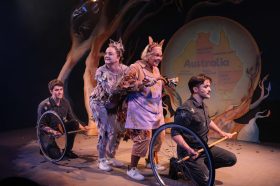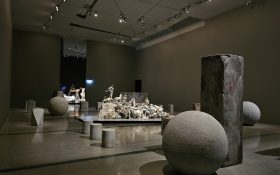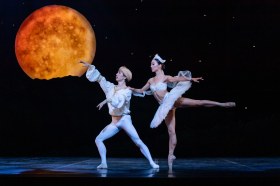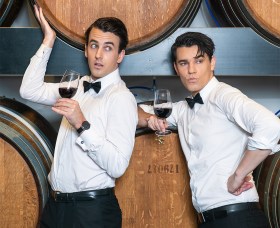There’s more to being an elder than just growing old, according to Boon Wurrung senior Elder, N’arweet Dr Carolyn Briggs AM.
‘Elders … come with roles, inherited roles and responsibilities. That’s what an Elder is in our society,’ she said, adding that being a recognised Elder not only means having ‘that inherited knowledge that is your cultural rights – you have to then transmit that knowledge on.’
In The ArtsHubbub episode nine, The Voice of Experience, we celebrate those whose wisdom has been gained over decades of artistic and cultural practice.
Joining Dr Briggs are writer, broadcaster, actor, producer and theatre-maker Annette Shun Wah, Artistic Director of Adelaide’s OzAsia Festival; and actor Tony Barry, one of the most familiar faces of the Australian screen.
Shun Wah, whose career began in film and television, has more recently has embraced an advocacy and development role in the theatre sector with her work at Contemporary Asian Australian Performance (CAAP). Like Briggs, she is committed to sharing her knowledge with others, including in an upcoming series of talks presented by OzAsia Festival.
‘I’ve always loved ideas and different ideas and different perspectives. And I think pretty much in everything I do … I feel like my role is to give people the opportunity to be exposed to a different way of thinking about things,’ Shun Wah explained.
Tony Barry, whose screen career includes films such as Newsfront and Road to Nhill as well as numerous TV appearances, wants to encourage ‘an appetite for activism in young actors and filmmakers by ‘using art as a means of expression and protest’.
‘I’ve long believed that, that the camera is the searchlight and the spear of the 21st century. If those who are holding it can train it on those corrupt institutions, the vibration that sets up is so powerful that it will bring them down,’ he said.
Our feature interview this month is with actor, writer, raconteur and living legend Uncle Jack Charles, whose life was immortalised in the film Bastardy and the ILBIJERRI stage production Jack Charles Versus The Crown.
He tells us about the early days of Nindethana, Australia’s first Aboriginal theatre company, and the impact of its early productions – especially a performance in Canberra attended by activists associated with the Aboriginal Tent Embassy.
‘And so, all the blacks had gathered to the fray to watch this, these three from the Nindethana theatre, the first Aboriginal theatre production – and Foley, McGinnis, all the Black Power movement, Dennis Walker, all came along in their droves to have a look.’
Subsequently, Charles spent many years in and out of jail. He also developed a heroin addiction – a habit he was able to kick in large part because of people’s respect for him as he aged.
‘I stopped because of the fact that I was getting older. People – even screws – were calling me “Uncle”. So having this sign of respect allowed me to believe, “No hang on, it’s everybody’s putting me on this pedestal”. You know, placing me in this position, here – in the nick of all places, you know? So then I must do something to do, to be that Uncle, to be that man, which means to say I have to forsake drugs,’ he told The ArtsHubbub.
The ArtsHubbub episode nine, The Voice of Experience with Uncle Jack Charles, is out now via your favourite podcast platform.
The ArtsHubbub episode nine: TRANSCRIPT
Sabine Brix: A heads up that this episode contains references to drug use and sexual assault.
Aboriginal and Torres Strait Islander listeners are warned that this episode contains discussion and the names of people who have died.
GD: Welcome to the ArtsHubbub, a monthly look inside Australian arts… and artists. I’m your host George Dunford.
This month we’re listening to the voice of experience – hearing from older Australian artists and arts workers who speak about their value to the arts community and some of the hard lessons they’ve learned in their lives.
In this moment, as our Aged Care system is in crisis, we reckon its a good time to value our elders and hear what we can learn from them.
Jack Charles: I was getting older, people were calling me Uncle. So having this sign of respect allowed me to believe, “No hang on, it’s everybody’s putting me on this pedestal.” You know, placing me in this position, here in the nick of all places, you know? Then I must do something – to be that Uncle, to be that man.
GD: That’s the actor, performer and writer Uncle Jack Charles – a member of the Stolen Generations whose resilience has helped him survive abuse, navigate the criminal justice system and overcome a heroin addiction to become a star of stage and screen. Shortly, we’ll hear more about how Uncle Jack found his way to becoming an arts elder through his career as an actor, potter and leader.
For the Nudge we talk with Annette Shun Wah, Artistic Director of the OzAsia Festival, about how she found her own way without the help of traditional mentors.
We yarn with award-winning Australian actor Tony Barry about his dramatic role changes and how he believes we can get out of our crisis of cultural colonialism by re-focusing on the stories of all Australians. And we hear from N’arweet Dr Carolyn Briggs, a Boon Wurrung senior Elder, about how we can reconnect with Indigenous Australian culture and transfer it on to future generations.
GD: Uncle Jack Charles is well known for his stage work, including groundbreaking theatre work in the 1970s and more recently, works such as ILBIJERRI’S Jack Charles vs the Crown. He’s also a familiar face in film and television, most notably in the 2008 documentary, Bastardy. In 2015, Uncle Jack was honoured as Senior Victorian of the Year and he’s recently written a memoir with Namilla Benson called Born Again Black Fella which connects his life and career.
As a member of the Stolen Generations, Uncle Jack was taken from his family as an infant and put into a boys home by the Salvation Army.
Jack Charles: I knew nothing about my family and during the latter years of my stay at the Box Hill Boys Home, having been visited in the 50s, late 50s by two people who said they were my Uncle and Auntie, Henry and Amy Charles, took me out on a picnic one Sunday. And that was the instance that I realised that, ‘Oh, I got family then, oh right, okay,’ and they ask me, I asked them where my mum is. And they said, you know, ‘We don’t know yet, Jack, we don’t know where your mother is, you’ll have to stay here until we can find her,’ and that so, so that broke the lie that the Salvos were telling me that I was an orphan. You gotta remember I was the only lone registered Aboriginal kid in that home…
GD: His family and his culture were not far away, although they’d been hidden from him for years. After he left Box Hill Boy’s Home he got an apprenticeship as a glass beveller but he wanted to know more about his history. He’d heard that in the inner city Melbourne suburbs of Fitzroy and Collingwood there were Aboriginal communities.
Jack Charles: …when I first went into Fitzroy, that was at the behest and the cajoling of my fellow workmates who said “there are a lot of blackfellas over in Collingwood, Jack, bet you’ve got family amongst them, go see for yourself, young fella”…
Well, I jumped off the tram on the corner of Napier and Gertrude Street and I’m surprised by this old fella yelling at me. “Charles! You Blanchie Charles’ boy,” and of course I shat myself, as the story goes, and then he grabbed me and he hugged me and then he fast walks me up to the Builder’s Arms and that, and of course, as soon as I’ve entered I’ve entered another world. You know. I’ve been… hidden away from this,this indigeneity. And it and so anybody who could they rushed up to introduce themselves to me as an Uncle, an Auntie, a cousin, and so I’m overwhelmed by their these people beery hugs and kisses. I didn’t drink so I dived into me paypacket and shouted a few beers and I had a lemon squash myself. And then one old lady, croaked, ‘You, your mum Blanchie, she’s living up in Swan Hill, young fella. You should go and see her.’ So of course I… I will, I tell her, first chance I get.
GD: Uncle Jack did visit his mother in Swan Hill but it didn’t go as well as he hoped. His mother had been connected to the murder of an Aboriginal Elder and she was isolated. As he grew older and started performing he felt like there was some distance between him and his community.
Jack Charles: They were very standoffish. I was the first son of Blanchie Charles. So I was ostracised in that sense. Aboriginal payback law’s a bitch. And so I suffered that. I thought it might have been the crushed yellow velvet flares I was wearing…
GD: Performing became an antidote to the isolation and he worked with Bob Maza to co-found Australia’s first Aboriginal Theatre company, Nindethana, in 1972. Their first show was called Jack Charles is Up and Fighting, a mix of topical comedy and music.
Jack Charles: We, we performed it down in Melbourne and then the Tent Embassy came up going, can we take it to the Tent Embassy in that there. And then I saw images on the telly and all the police and all that. ‘No, I’m a bit iffy about all the police, Jack, ah, Bob,’ you know.
So the Pram Factory arranged for us to do it at the ANU, the University there. And so, all the blacks had gathered to the fray to watch this, these three, from the Nindethana theatre, the first Aboriginal theatre production – and Foley, McGinnis, all the Black Power movement, Dennis Walker, all came along in their droves to have a look. And then they really enjoyed it, McGinnis, Foley, realising the potential of this medium, to spread the word and that, you know? And Foley still remembers, he regularly, you know, pops out a little bit of his memory on seeing me for the first time on the stage. And then he was right at the back and he can hear my voice clear as a bell.
GD: But Uncle Jack was also jailed 22 times in his early life for committing burglaries and was addicted to heroin. In prison up in Castlemaine he was asked to run the pottery shop selling their wares at markets in the area and running it with his own version of Aboriginal law.
Jack Charles: Well, I never knew much about my law but you know as an Aboriginal so, you know, you got to use your fine sense of con-artistry to say, ‘Well, this is Aboriginal law, you’re not allowed to be Rohypnoled or Serepaxed off your tits in in my pottery shop.’ I called it Psycho Ceramica pottery shop, because you have to be in one way a psycho to be in the nick in the first place [laughs].
If you were if you were one of the people in the Psycho Ceramica pottery and that you wanted to take out a whole box-load of crockery that you made, you know, well you have to leave something of equivalent value for me to sell down up to Wonrun you know, Castlemaine even. So we made a profit and I always had that notion that if ever I did leave for good from jail, I would set up a place myself in a position to set up my own Psycho Ceramica pottery shop outside. But of course when you come out homeless continuously, you know, your first act is to leave the plastic bag in the, the luggage, the locker in Spencer St there – Southern Cross there now – and go and hunt up a whack, as you do. And so you got your first bed for the night at the dealers’ place and your series of welcome home whacks. You’re straight back into the hard lane again, you know, even going out late that night, after that and doing a series of burgs, you know?
GD [in the room]: What What got you off heroin? What stopped you using?
Jack Charles: My Aboriginality, you know, the full fact of the matter. I really absorbed my Indigeneity. And you know, the simple terms, the most simplest of terms real black fellas oughtn’t to be shooting white powder. We start behaving like white people when we do – we’re stealing things. We’re bashing our women folk, we’re disrespecting our culture. Well, this is what the white people do. Exactly. Y’know, don’t behave like a whitefella like a blackfella. Don’t use powders. And so you know, and I’ve lived by that motto ever since, you know? I stopped because of the fact that I was getting older, people – even screws – were calling me Uncle.
So having this sign of respect allowed me to believe, “No hang on, it’s everybody’s putting me on this pedestal’. You know, placing me in this position, here in the nick of all places, you know? So then I must do something to do to be that Uncle, to be that man, which means to say I have to forsake drugs…
You know, I’ve nearly died in jail a couple of times. The last jail sentence was, I was close to it as a matter of fact, I don’t know how I survived that. It was due the fact that Auntie Lorraine Peeters and her daughter had come in on that last jail sentence. And in my last month I undertook a cultural awareness program, the Marumali programme, which twigged immediately to me, ‘cause I was getting older, you know, getting more wiser, you know, and I was crook at the time too. And so ah, the penny dropped, and I had great intentions of coming out and being the Smith Street, the Kurdaitcha Man, the lore man of the Smith Street strip, which I did do – and that meant that I had leadership skills that I said, Well, I am a leader in my own right. You know what the funny part of it is, I always say, I am Jack Charles. I am JC. Perhaps I am the Second Coming – brown, like the original, hey? I’ll go with that. You want to come along with me? [laughs]
GD: If it wasn’t for COVID, you’d be able to see Uncle Jack Charles in Black Ties, a collaboration between ILBIJERRI and Te Rēhia Theatre which was due to be playing at Brisbane Festival. He is still Zooming into youth detention centres today though, so once the COVID lockdown lifts you can bet Jack Charles will be up and fighting again, on a stage or screen near you.
Ad break (Sabine Bix): At ArtsHub we’ve been supporting Australian art for 20 years. Our team of writers and journalists keep the arts community informed and connected, a vital role in these challenging times. Right now we need your help to continue being the go-to news source for the arts sector. You can join or give a membership to a friend at support.artshub.com.au
GD: Now for the Nudge, our monthly look at improving your arts practice.
This time, we explore transferring knowledge down to younger generations, whether through mentoring or more casual ways of communicating.
With the arts under fire, there’s much to be learned by turning to our elders to see how they’ve maintained integrity throughout their careers, and found ways to just keep on going.
GD: In her early career in the 1980s, Annette Shun Wah didn’t have many mentors.
Annette Shun Wah: My career through radio and television, I, you know, maybe, maybe this will do a terrible disservice to people who were around, but I did feel like I was out there on my own and having to sort of clear a path for myself.
You only helped people if you thought they could help you. And that was the view I had of it. And that was a pretty.. difficult thing to learn as a very young person going into this world from a completely different world, like I’d just been a uni student before that. So it was a very quick growing up, and I probably learnt the wrong way to think about things right from the beginning. And it took a while to pull back and start thinking about my colleagues as being people who I could probably have a relationship with that was more than just that work relationship.
GD: As a fourth generation Chinese Australian, Annette was also aware that her representation of experience wasn’t visible in Australian media.
Annette Shun Wah: When I’ve been more engaged with, you know, that whole conversation around representation of people, with cultural diversity on our stages and screens, I realised just how little change was happening, and how everyone who I spoke to was going through the same difficulties that I had been going through. And instead of continuing to sort of hit my head on a brick wall kind of thing, I thought, this can only work as if we help each other out, and I didn’t want younger people to give up because they went through the same thing as I was going through – especially since I was meeting a lot of people a hell of a lot more talented than I was. And I thought, “What a waste, you know, if they give up,” so, so that, that was a little bit of a change. But then as you get older, you realise that by doing that, it’s a really important thing, but it’s incredibly rewarding. And in many ways that, that is my reward these days.
GD: N’arweet Dr Carolyn Briggs is a Boon Wurrung senior Elder and a lot of her time is spent giving back to the community as an Indigenous mentor with academic roles in art, design and architecture at both Monash and RMIT. Her reward is the reciprocity of this intergenerational learning.
Carolyn Briggs: But with the design students, I’m working with them to get them to understand people and place through their design elements – and that’s what you work with. I learn a lot about the way they see design, and particularly with architecture and how they want to embed Indigenous concepts into place, just understanding stories, understanding the place that they are working on, understanding the impact social impacts on people – which some would be aware of and I find a lot of the kids have no awareness of First Peoples or the people’s knowledge of the First People or like Indigenous history.
GD: Carolyn emphasises that her work looks at connecting with our past and acknowledging colonialism.
Carolyn Briggs: It’s about the human relationships with other people. So it’s being mindful. It’s also understanding the rich tapestry that this country has to offer, that when we offer this up, we’re offering a part of ourselves up, but also the input from other other people. If they understood their own stories, they would understand the purpose of why they came to this country. And, and, and how they had embedded themselves into this country and called themselves Australians.
GD: Tony Barry is one of those familiar actors who’s been in everything from Newsfront to Mystery Road. The power of telling Australian stories has kept him motivated throughout his career. Of all of these roles it was the TV miniseries, Scales of Justice – influential in the downfall of the Bjelke-Peterson Government – which was one of the most powerful roles of his career.
Tony Barry: As an actor, every actor in that had steel in their spine because suddenly, they were working on something that meant something. It wasn’t just a product, it actually meant something. And it got rid of the Premier. How powerful is that? I’ve long believed that, that the camera is the searchlight and the spear of the 21st century. If those who are holding it can train it on those corrupt institutions, the vibration that sets up is so powerful that it will bring them down.
GD: Now as a mentor and teacher, Tony encourages artists to connect with meaningful work and those rewards that are often not financial but more valuable. His most impassioned project focuses on the environment by empowering youth to have their say in the future of their planet.
Tony Barry: That’s something that I am hoping we can encourage in young ones, an appetite for activism using art as a means of expression and protest. Because that way, they won’t come to grief with the police batons. But they’ll be able to make their statement and if they can hold up their art saying, “if you’re not doing it for us, who are you doing it for?”
GD: Tony has seen culture change around him and has witnessed a new form of cultural colonialism, which he believes has seen us following America at the expense of our own stories.
Tony Barry: This is where we should be – telling Australian stories because that’s the only way that’s going to pull us out of the morass that we’re in, that we’ve allowed ourselves to be conned into believing that America is the model we should be chasing. Have a look at America. Have a look at the state of it. Is that where we want to finish up as a country? We’re still – we have a chance in this country, I believe, if the artists, poets, writers, musicians and filmmakers, knuckle down and tell their stories. Don’t try and second guess and don’t try and get out there and amongst at all and just earn the big bucks. They probably won’t make much money. But they’ll be true to their integrity.
GD: Making the space to hear Australian stories – stories from Aboriginal and Torres Strait Islanders – is one way of creating understanding and bringing attention to the communities that have been made less visible in our collective history.
Carolyn Briggs: It’s something that you have to walk alongside people to be a part of understanding and recognizing that we’re not the deficits on it, and we’re not the silent partners in this history. So whether it’s, it’s frustrating or whether, whatever what people may see of us, and understanding how we see them within our landscape. And how, yeah, and I think people need to be more aware how they have an impact on the footprints of our ancestors, you know, on this land. So it’s a big journey.
We’re getting a lot of more academic Indigenous people being able to transport that knowledge into their curriculum. So we’re becoming curriculum writers and in trying to embed to different areas that are either in science or through language through all sorts of things, that it’s been a challenge for us because now we’re, we’re playing a major role and they’re the challenges for us – to embed our culture into something that has been has denied us, you know, and it’s, it’s those opportunities – the elder the context of elder and the responsibility of an elder is to transmit that knowledge to all people what enter our country.
GD: For Annette, there’s a recognition of the community that has gathered around her during her lifetime – a community that she has played an active role in growing through her work with Contemporary Asian Australian Performance – and that she has a responsibility to that community. But is it too soon to call her an elder?
Annette Shun Wah: I feel that we have a community now of Asian Australian performers in particular. So I feel like an elder amongst them. Because I do feel like I’ve gathered them around me a little bit. And I also feel like yeah, I’m the oldest person in the room. So no, it’s not too soon [laughs]. But I do also feel that I do have a kind of power, partly because I’ve had a public profile, which has put me into a position where I can have the conversations with whoever I need to have the conversations with. I’m often invited into the room to have those conversations. I’m no longer outside knocking on the door, hoping to be let in.
Carolyn Briggs: And Elders that come with roles, inherited roles and responsibilities. That’s what an Elder is in our society. That’s the dive from being older to elder, and what is a recognized Elder is that inherited knowledge that is your cultural rights, that you have to then transmit that knowledge on.
GD: It’s a little like that recognition that Jack Charles had that he was being seen as an Elder, an Uncle and that he had to do something with that pedestal. But that role shouldn’t be too prescriptive – it should be a guide rather than a dictator.
Annette Shun Wah: I’ve always loved ideas and different ideas and different perspectives. And I think pretty much in everything I do, my – I feel like my role is to give people the opportunity to be exposed to a different way of thinking about things.
Not necessarily that I advocate that new way of thinking, but just, I think it’s great for all of us to have that choice, to have that opportunity to see and think about things in a different way. And then it’s up to us individually to decide, “that works for me but that doesn’t work for me,” or “actually, the way I’m doing things is pretty good”. So it’s not our job to change people’s minds. It’s to open them up to new possibilities and then, then they can be more assured about the way they’re doing things or maybe they will change. That’s up to them.
GD: None of us are getting any younger. It’s a common expression, but more than just accepting ageing perhaps what we need is to see it as a responsibility, a time when we take on a new role in our arts community and share what we know with younger generations. Our best Elders show us how to build our community, fight for what’s important by looking honestly at our history, and guide us to better futures which might just be their greatest legacy.
Credits
GD: Thanks for listening to The ArtsHubbub, we’ll be back next month. You can contribute a review of The ArtsHubbub or rate us via Apple Podcasts.
Our guests this month were: Uncle Jack Charles, Tony Barry, Annette Shun Wah and N’arweet Dr Carolyn Briggs.
The ArtsHubbub is produced by Michelle Macklem, Sabine Brix, Richard Watts and George Dunford.
Our theme music is ‘Chasing Waterfalls’ by Tim Shiel. Music in this episode also by The Other Stars.
And our coverage of COVID-19 is still free outside of the paywall, so you can stay connected during this time at www.artshub.com.au
This podcast was produced on the lands of the Kulin Nation. We pay our respects to Kulin Elders, past, present and emerging. Sovereignty has never been ceded.
